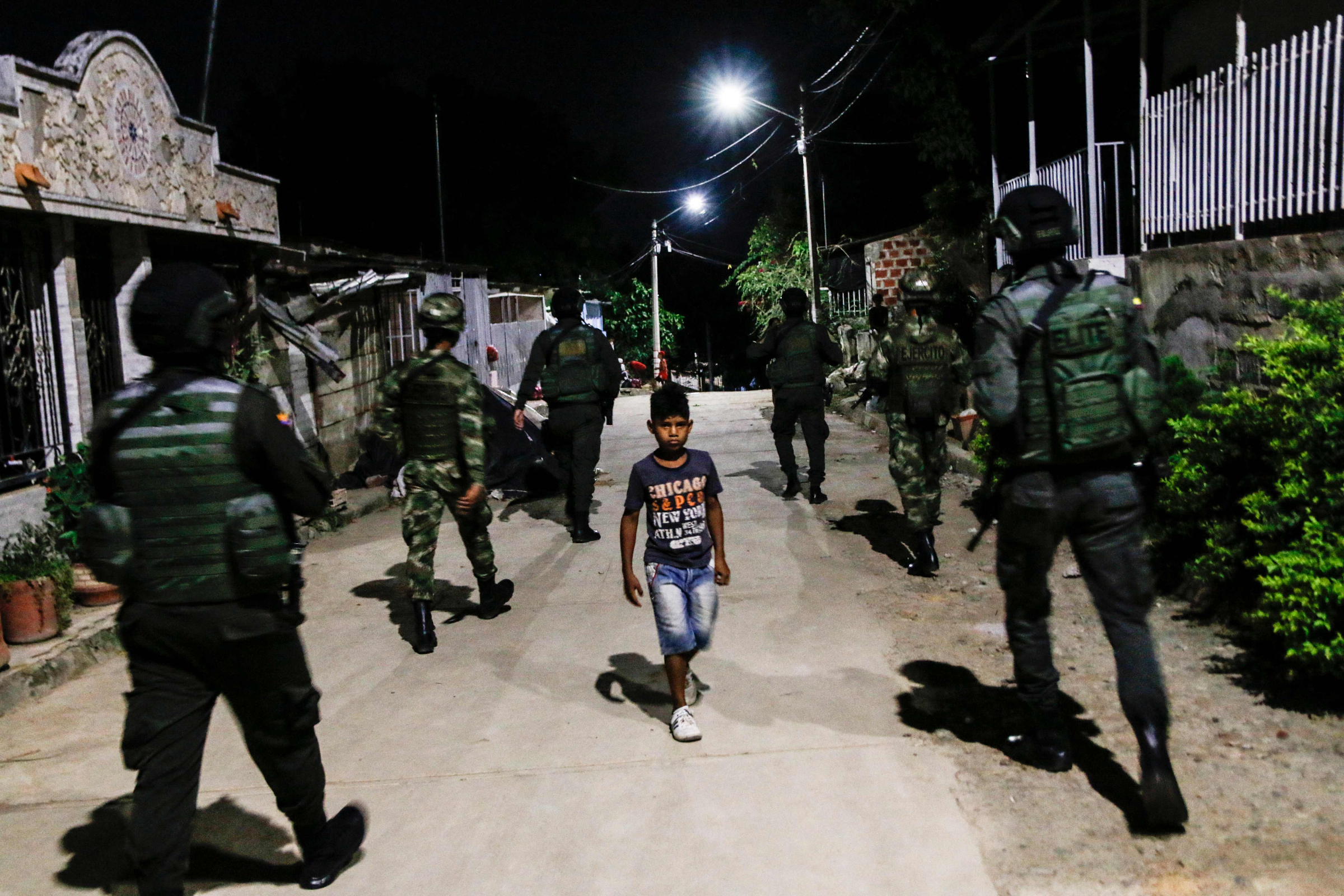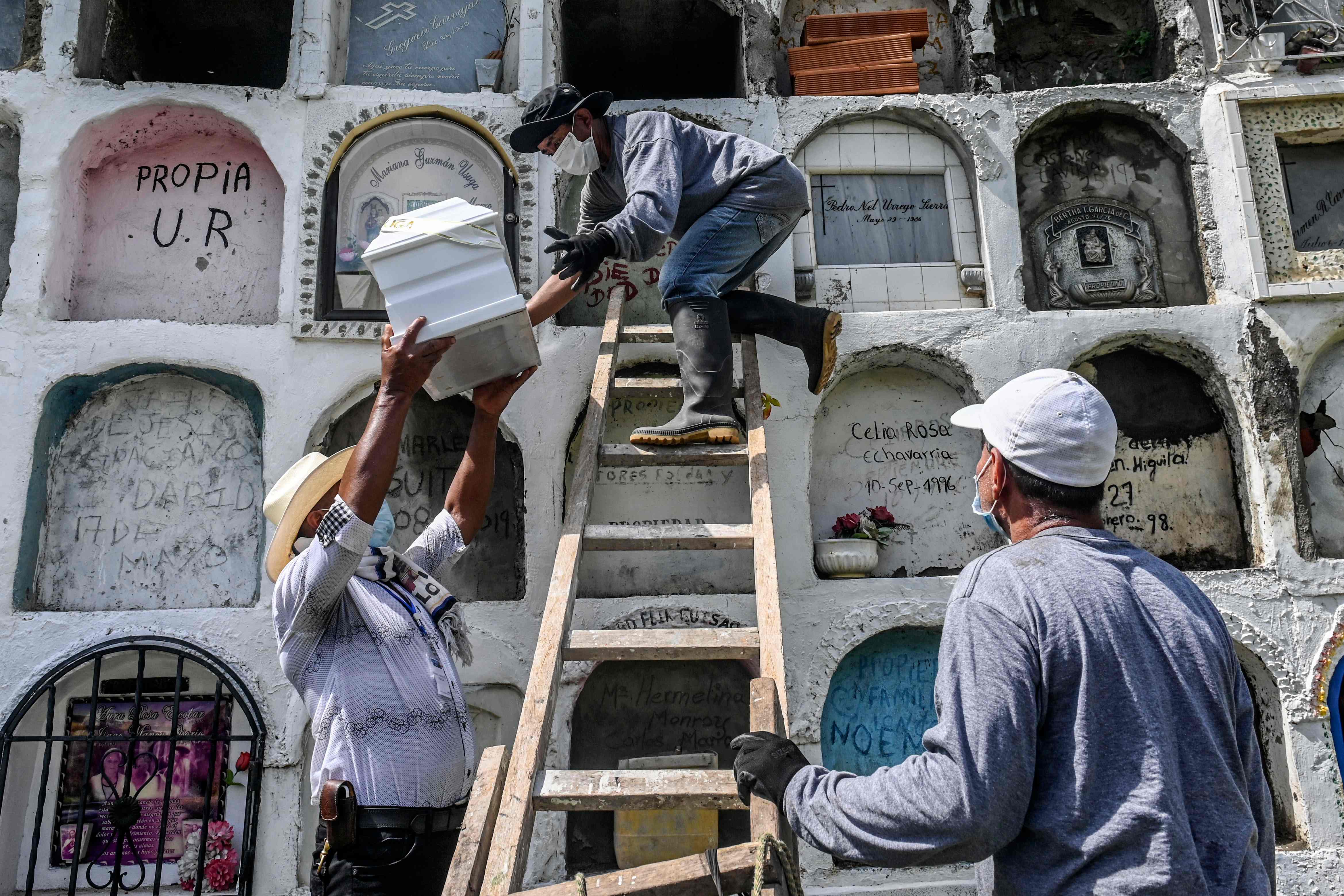Share post now

global
The Alliance Sud magazine analyses and comments on Switzerland's foreign and development policies. "global" is published four times a year (in german and french) and can be subscribed to free of charge.
Peace policy in Colombia
21.06.2024, International cooperation
For the first time two years ago, Colombia elected a President, in the person of Gustavo Petro, who did not come from the old elites. In a country where huge swathes of territory are still controlled by armed groups, his government has set an ambitious goal, that of "Paz Total" – total peace.

A child walks between patrolling Colombian soldiers at a checkpoint on the Colombian-Venezuelan
border in Cucuta. © Schneyder Mendoza / KEYSTONE / AFP
At the end of March, Alliance Sud member organisation Swissaid organised a trip for a delegation of parliamentarians from four parties. Alliance Sud also went along. The peace process was a key topic at the numerous meetings held with Swiss NGOs, Colombian civil society, government agencies and members of the Swiss Embassy.
Gustavo Petro's election in 2022 was historic. For the first time in Latin America's longest-standing democracy, the man who took the reins of power, unlike all his predecessors, did not come from the dominant parties of the elite and from the group of 30 families that controlled Colombia. Yet, the ex-guerrilla fighter, who did prison time in the 1980s and is backed by a broad civil society coalition, has no majority in the parliament. His government's task is also not being facilitated by the influx of more than 3 million people fleeing Venezuela for Colombia.
Colombia experienced yet another historic event in 2016 when, after years of negotiations with the guerilla forces of the FARC-EP (Fuerzas Armadas Revolucionarias de Colombia – Ejército del Pueblo), a peace treaty was concluded and 14,000 fighters (40 per cent women) surrendered their weapons. This did not bring peace to the country, however; not only are there problems with implementing the peace agreed with the FARC-EP, but armed groups continue to control vast areas of the country. The "Paz Total" solution proposed by Petro and enthusiastically advocated by government representatives and civil society, is more than ambitious. But it goes to the heart of the matter: without a peace that also encompasses the economic and social development of a hinterland in total neglect, and without a civil society that can function in the absence of death threats and assassinations, there can be no lasting peace.
Regrettably, things are moving in the wrong direction in many areas, which are witnessing a resurgence of armed violence. There are various reasons for this. The State failed to fill the vacuum left behind in many regions by the FARC-EP following demilitarisation. FARC splinter groups and other formations took over. There had been no real disarming of the paramilitary forces, which had been backed by the army in their fight against the guerrilla forces and the population in order to safeguard the interests of landowners; and, of course, the greatest scourge of Colombia and neighbouring countries – cocaine. Mexican drug cartels now control large parts of the "supply chain". The dividing lines between paramilitary forces and the armies of the cartels are just as fluid as those demarcating some guerrilla groups.

A relative of a victim of the Colombian conflict hands over the urn containing the mortal remains to a gravedigger at the cemetery in Dabeiba, Antioquia department. © Joaquin Sarmiento / KEYSTONE / AFP
Peace negotiations with armed groups are a crucial part of the Total Peace agenda. Switzerland has been engaged in Colombia since 1998, and most recently through all three "arms" of its international cooperation programme: the Swiss Agency for Development and Cooperation (SDC), the State Secretariat for Economic Affairs (SECO) and the Peace and Human Rights Division (PHRD). Since 2022, the Petro Administration has been negotiating with the rebel group ELN (Ejército de Liberación Nacional), and since 2023, with the EMC FARC-EP (Estado Mayor Central de las FARC-EP), a FARC splinter group that had not participated in the 2016 peace arrangement. Switzerland is an accompanying State in the process with the ELN, and a guarantor State in the case of the EMC FARC-EP, in each case jointly with other European countries and, as the name suggests, more intensely with the EMC FARC-EP.
In both cases, Switzerland is present at the negotiations and, according to the PHRD, advises the negotiating parties on the topics of process design, ceasefire, participatory mechanisms, communications, dealing with the past, and protecting civilians. On account of the sluggish implementation of the peace agreement with the FARC-EP, which contains more than 500 specific points, partial agreements are to be negotiated this time round, so that they can be implemented separately. Similarly, the talks are not being conducted at a central location abroad but in a decentralised manner in the regions concerned, and this makes for broader participation.
One major stumbling block to the current negotiations is the incomplete implementation of the 2016 peace agreement. The guerrilla fighters are understandably mindful of this at the negotiating table and do not wish to end up in the same place. The agrarian reform measures were those least implemented; only 7 per cent of them were fully implemented, and 18 per cent partially. This shows that traditional development cooperation methods are crucial to securing lasting peace.
The withdrawal of SDC from Latin America is reducing engagement in Colombia, even though Switzerland retains a presence through humanitarian aid and the PHRD. In 2021, there was more funding available for SDC bilateral cooperation than for the work of the PHRD. Overall support declined from 33 million (2021) to 20 million francs (2023), though the amount for the PHRD increased slightly. SECO also plans to withdraw fully by 2028. Instead, Morocco will become the new priority country. In this regard, the draft IC Strategy 2025-2028 states meaningfully that this is in keeping with the stronger geographical focus and facilitates the move towards other foreign economic policy instruments.
It is doubtful whether, with less funds – we cannot downplay the impacts of more planned cuts owing to the reallocation of IC funds to Ukraine – Switzerland will be able to continue to play its key role. The projects being carried out by Swissaid and other Swiss NGOs to strengthen civil society and rural development in Colombia are more crucial than ever.
Share post now

global
The Alliance Sud magazine analyses and comments on Switzerland's foreign and development policies. "global" is published four times a year (in german and french) and can be subscribed to free of charge.